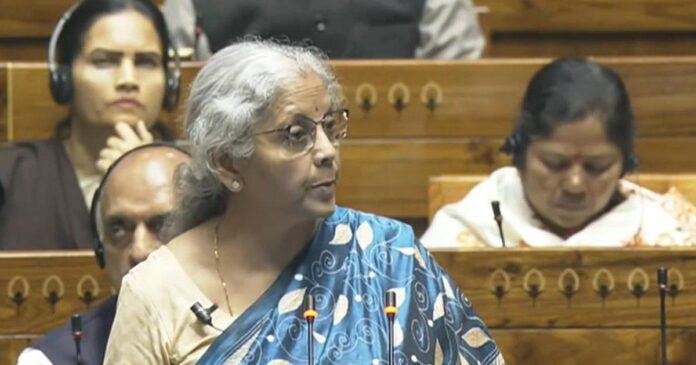Manoj Kumar Pathak
New Delhi: The Central government is poised to unveil a white paper in Parliament on Thursday, shedding light on what it terms as the “economic mismanagement” during the tenure of the Congress-led United Progressive Alliance (UPA-II) from 2004 to 2014.
The anticipated White Paper aims to delve into India’s purported “economic woes” and the adverse repercussions witnessed during the UPA regime.
It will also outline the potential positive measures that could have been undertaken by the UPA government to mitigate the economic challenges.
Union Law Minister Arjun Ram Meghwal, while addressing the media outside Parliament, emphasized the necessity of the white paper, asserting, “The economic predicament orchestrated by the Congress in 2014 warrants acknowledgment. Today’s deliberation will center around the subject of the White Paper.”
A White Paper is typically a government document designed to elucidate new policies, accomplishments, solicit support, and gauge public sentiment.
Finance Minister Nirmala Sitharaman had alluded to the white paper during her interim budget speech on February 1, citing India’s purported “crisis” in 2014 and the subsequent efforts by the Modi government to steer the economy towards sustainable growth.
In response, the Congress unveiled a “Black Paper” on the same day, aiming to counter the narrative presented in the government’s anticipated white paper.
Congress President Mallikarjun Kharge, addressing a press conference, highlighted the Black Paper’s emphasis on the government’s alleged failures in addressing unemployment, inflation, and agrarian distress. Kharge further accused non-BJP ruled states like Kerala, Karnataka, and Telangana of facing discrimination under the current regime.
Alleging a threat to democracy, Kharge criticized the BJP government for what he perceived as its undemocratic actions over the past decade, including the dissolution of governments in which the Congress was involved.
Coal Block Allocation
The scandalous affair of coal block allocation to private entities marked a grievous misstep in governance, inflicting an estimated loss of ₹1.86 lakh crore upon the nation’s coffers. The egregious nature of the situation prompted the Supreme Court to nullify 204 such allocations.
As of now, legal proceedings have concluded for 47 cases, with investigations ongoing in 10 instances, while 14 cases have seen convictions.
Commonwealth Games
The Commonwealth Games debacle epitomized a saga of corruption, mismanagement, and nepotism, permeating the entire spectrum of planning, construction, and execution of associated infrastructure projects. Allegations abound of collusion between government officials and contractors, engaging in a litany of corrupt practices ranging from inflated contracts to kickbacks and the embezzlement of funds. Notable areas tainted by corruption include stadium construction, infrastructure development, procurement processes, and various project contracts linked to the Games.
Presently, eight cases have seen formal charges filed and are subject to trial in Delhi courts.
2G Telecom Spectrum Scam
Unfolding in 2008, the 2G spectrum scandal epitomized a saga of irregularities and corruption in the allocation of second-generation telecom spectrum licenses by governmental authorities. Shockwaves reverberated when revelations surfaced of licenses being undersold well below their market value, purportedly through a rigged and manipulated process. The repercussions were dire, with the Indian government hemorrhaging an estimated ₹1.76 lakh crore, as per the Comptroller and Auditor General of India (CAG).
Saradha Chit Fund Scam
The collapse of the Saradha Group in 2013 unleashed financial turmoil upon millions of investors ensnared in a Ponzi scheme. Central to this debacle was the conglomerate’s operation of collective investment schemes, including chit funds, which promised returns but ultimately failed to deliver.
INX Media Case
Emerging in 2017, the INX Media imbroglio originated from allegations of irregularities in foreign direct investment (FDI) approvals, implicating high-ranking officials. The probe, initiated by the Central Bureau of Investigation (CBI), quickly expanded to include accusations of money laundering, suggesting illicit payments in exchange for favorable treatment in the FDI approval process.
Aircel-Maxis Deal
The Aircel-Maxis saga, commencing in 2011, unfolded against a backdrop of alleged regulatory breaches in the investment approval process. Key figures, including former Union Minister P. Chidambaram and his son Karti Chidambaram, found themselves embroiled in accusations of kickbacks linked to facilitating the deal.
Antrix-Devas Deal
This controversial deal centered on the leasing of coveted S-band spectrum to Devas Multimedia for satellite-based multimedia services. Accusations swirled around irregularities in spectrum allocation and preferential treatment, leading to significant revenue losses and legal skirmishes following its cancellation.
Land for Jobs
Under scrutiny are individuals or groups accused of leveraging influence to secure land or property in exchange for facilitating job placements within the Group ‘D’ category of the Indian Railways. Investigations are ongoing.
Allotment/Release of Prime Land
Numerous cases involve the release of prime land from acquisition in collusion with private builders and the allocation of industrial land to close associates. Charge-sheets have been filed, with trials underway.
Adarsh Housing Society Scam
Initially conceived to provide housing for war widows and veterans, the Adarsh Housing Society scandal unraveled a sordid tale of politicians, bureaucrats, and military officers exploiting the project for personal gain.
Augusta Westland Helicopter Scam
The procurement of AugustaWestland helicopters in 2010 for VIP transport purposes turned sour amidst allegations of irregularities and kickbacks. The cancellation of the contract in 2014 followed a maelstrom of accusations, signaling a contentious chapter in defense procurement.


